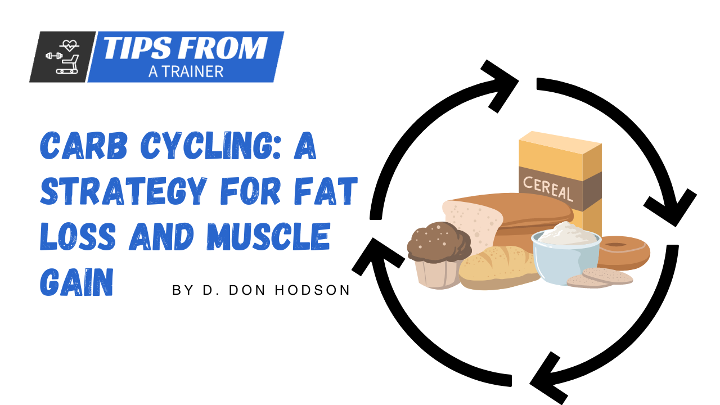Introduction
In the quest for a fit and healthy body, finding the right strategy that promotes both fat loss and muscle gain can be a challenge. One approach that has gained popularity in recent years is carb cycling.
This dietary technique involves alternating between high-carb and low-carb days strategically to optimize fat burning, muscle building, and overall body composition.
In this article, we will explore the principles behind carb cycling, its benefits, and how to implement it effectively into your fitness routine.
Table of Contents
Introduction
Understanding Carb Cycling
What is Carb Cycling?
The Science Behind Carb Cycling
Implementing Carb Cycling
Customizing Your Carb Cycling Plan
High-Carb Days: Fueling Muscle Growth
Low-Carb Days: Enhancing Fat Burning
Tips and Considerations
Monitoring Progress and Adjusting
Customizing Based on Individual Needs
Conclusion

Understanding Carb Cycling
What is Carb Cycling?
Carb cycling is a nutritional strategy that involves cycling between periods of high-carbohydrate intake and low-carbohydrate intake throughout the week. By manipulating carbohydrate consumption, you can optimize energy utilization, stimulate fat burning, and support muscle growth.
The Science Behind Carb Cycling
Boosting Metabolism Naturally
Carb cycling can help boost your metabolism by preventing it from adapting to a consistent low-calorie or low-carb diet. Alternating between high and low-carb days keeps your body guessing and maximizes calorie burning potential.
Insulin Sensitivity and Fat Loss
Low-carb days in a carb cycling plan can enhance insulin sensitivity, which promotes efficient utilization of carbohydrates and prevents excess fat storage.
Muscle Building and Recovery
High-carb days replenish glycogen stores, which are essential for intense workouts and muscle recovery. This enables you to perform at your best during muscle-building exercises.
Implementing Carb Cycling
Customizing Your Carb Cycling Plan
Determining Your Caloric Needs
To create an effective carb cycling plan, start by calculating your daily caloric needs based on your goals and activity level.
Setting High and Low-Carb Days
Designate specific days for high-carb and low-carb intake based on your training schedule and preferences. For example, high-carb days can align with intense workout days, while low-carb days can fall on rest or light activity days.
High-Carb Days: Fueling Muscle Growth
Selecting the Right Carbohydrate Sources
Focus on complex carbohydrates like whole grains, fruits, and vegetables. These provide sustained energy and essential nutrients while minimizing blood sugar spikes.
Timing Carbohydrate Intake
Consume the majority of your carbohydrates around your workout window to optimize glycogen replenishment and support muscle recovery.
Low-Carb Days: Enhancing Fat Burning
Choosing Healthy Fats and Proteins
On low-carb days, prioritize healthy fats like avocados, nuts, and olive oil, along with lean protein sources like chicken, fish, and tofu. These promote satiety and help maintain muscle mass.
Incorporating Fibrous Vegetables
Including fibrous vegetables in your meals adds bulk and nutrients while keeping the overall carbohydrate content low. Examples include broccoli, spinach, kale, and cauliflower.
Tips and Considerations
Monitoring Progress and Adjusting
Regularly assess your progress by tracking body composition changes, energy levels, and workout performance. Adjust your carb cycling plan accordingly to optimize results.
Customizing Based on Individual Needs
Remember that everyone's body is unique, and what works for one person may not work for another. Experiment with different carb cycling protocols and listen to your body to find what suits you best.
Conclusion
Carb cycling is a powerful strategy for individuals looking to simultaneously burn fat and build muscle. By manipulating carbohydrate intake strategically, you can optimize energy utilization, promote fat loss, and support muscle growth. However, it's essential to customize your carb cycling plan based on your goals, preferences, and individual needs. Remember, consistency, proper nutrition, and regular exercise are key to achieving long-term success.

Don Hodson, Certified Personal Trainer
I'm Don, an ACE-certified personal trainer and the founder of Tips From A Trainer. With my passion for fitness and years of experience, I've helped countless individuals transform their physiques!
Having personally overcome weight challenges throughout my life, I understand the struggle. Through consistency, exercise, and a balanced diet, I have managed to stay in shape and I want to share my message with the world!
The fitness industry is fraught with misconceptions and deceptive practices, which is why I am committed to providing you with the truth.
- My Site: www.Don-Hodson.com
- My Company: www.ConnectedAgeMarketing.com

Carb Cycling